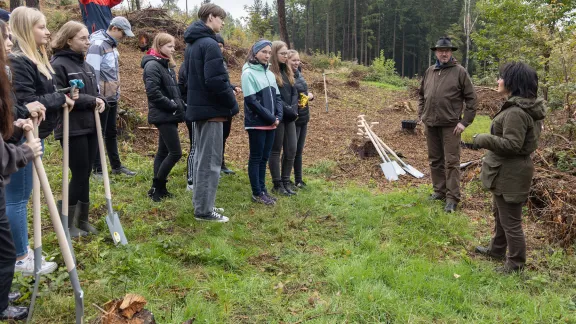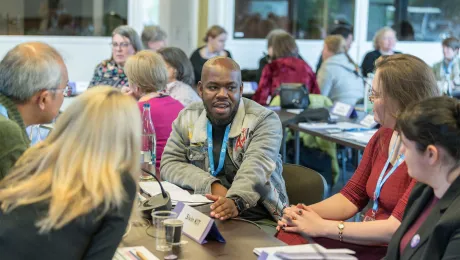Preserving habitats for people and nature and experiencing hope and energy in the process is what Bishop Bilz and youth from the Evangelical Lutheran Church of Saxony, Germany, experienced in a joint project.

Forest ranger Leila Reuter (right) explains the eco-system of the forest to youth from the Evangelical Lutheran Church of Saxony and Bishop Tobias Bilz. Photo: EVLKS/W. Müller-Wähner
Young people share their view of the church and gain insight into the church’s forest management
(LWI) - Bishop Tobias Bilz of the Evangelical Lutheran Church of Saxony, Germany, recently planted more than 500 trees with a group of young people aged 15 and 16.
“Hope is not just a word but an attitude,” said Bilz. The tree planting campaign is one result of a letter the bishop wrote to all baptized young people in his church.
Many young people see the challenges of climate change and are worried. Bilz said he was impressed by the group’s energy and commitment and had experienced the incredible power of taking a spade and acting jointly to protect the forest and the climate. “Doing something with your own hands is the best way to realize that you can make a difference in life,” he noted.
In his letter, he pointed out that “in our Tanzanian partner church, it is a tradition for all confirmands to plant ten trees” during confirmation. He wrote that forests in Saxony “are also suffering from drought and forest fires,” expressing his wish to work with young people “to ensure that young trees can grow into forests here with us.” Forests, he went on, “provide habitats for animals and plants; they are places of recreation for us humans and important for protecting the climate.”
Youth are active members of the church
In his letter, Bilz also asked the young people what they appreciated about the church and where they would like to see changes. The Saxonian bishop said he was delighted with the numerous responses. “It gives me hope when young people say that they experience faith in God and the community in our church as something significant.” The young people mentioned many other aspects they find important about the church – singing together, attending the youth congregation, retreats and camps, and youth services.
“But they also stated clearly the changes they would like to see, “and that is just as important and significant for me,” said Bilz. For example, many wanted more openness and tolerance in the church, more modern songs and services and more participation and opportunities for young people.
Under the guidance of forest ranger Leila Reuter, Bilz and the young people planted 500 pine trees in a church-owned forest. Reuter explained what the forests are suffering from and how the church’s forestry unit is countering this. “Our tree species cannot adapt as quickly as the climate changes,” Reuter said. That is why forest management relies on natural regeneration, for example, with beech and sycamore maple, and on reforesting with tree species that have a high ecological tolerance to water and heat: “These include pioneer tree species such as pine – tree species that helped to create our forests after the ice age,” Reuter said.


